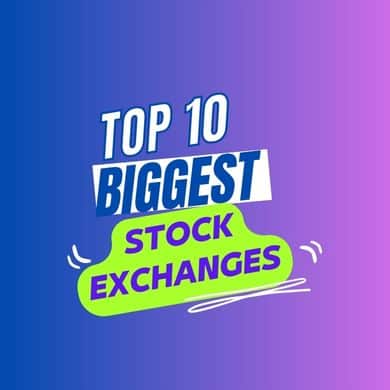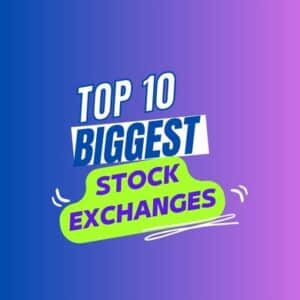A stock exchange is a platform where investors can engage in the buying and selling of various securities, such as stocks, bonds, derivatives, commodities, and other financial instruments. It represents a crucial aspect of the financial market, and its performance is an indicator of the global economic status. In this article, we will explore the top ten largest stock exchanges globally.
The exchange grants membership to authorized brokers and intermediaries responsible for facilitating securities transactions. It ensures adherence to fair trade policies and transaction regulations. Additionally, the stock exchange is comprised of different indices that reflect the financial standing of the country.
Traditionally, these exchanges were physical structures located in various countries of operation, but the trend has shifted to electronic trading, with many closing their trading floors. The securities’ prices are primarily determined by the laws of supply and demand, with buyers and sellers placing orders for execution. The following is a list of the world’s top ten stock exchanges.
1. New York Stock Exchange (NYSE):
Established in 1792, the New York Stock Exchange (NYSE), located in the heart of New York City, is considered the largest stock exchange in the world, with a market capitalization exceeding $30 trillion. The NYSE is a hub for numerous international and domestic stocks, bonds, and securities, and has played a significant role in shaping the global financial landscape over the centuries. The exchange’s longevity, combined with its innovative approach and cutting-edge technological advancements, has made it a sought-after platform for investors worldwide, making it a pillar of the global economy.
2. Nasdaq:
Following closely behind the NYSE is Nasdaq, a stock exchange headquartered in New York City, with a market capitalization surpassing $20 trillion. Nasdaq is renowned for its concentration on technology-based corporations, making it a popular destination for investors seeking high-growth potential in the tech sector. Over the years, Nasdaq has played a significant role in advancing the growth of numerous technology startups, making it a vital contributor to the advancement of the global tech industry. The exchange’s dynamic and forward-thinking approach, combined with its strong market presence, has made it an attractive investment opportunity for traders looking to capitalize on the tech sector’s rapid growth.
3. Tokyo Stock Exchange:
With a market capitalization exceeding $5 trillion, the Tokyo Stock Exchange (TSE) is the largest stock exchange in Asia and the third-largest globally, headquartered in the vibrant city of Tokyo, Japan. The TSE has been operational since 1878, and it’s rich history and strong presence in the Asian markets have made it a crucial contributor to the region’s economic growth. The TSE boasts a diverse range of securities and investment opportunities, making it a hub for both domestic and international investors. The exchange’s commitment to innovation and technological advancements has enabled it to stay ahead of the curve in an increasingly digital world, cementing its position as a leading stock exchange globally.
4. Shanghai Stock Exchange:
Boasting a market capitalization exceeding $6.87 trillion, the Shanghai Stock Exchange (SSE) is China’s largest stock exchange and the fourth-largest globally. Founded in 1990, the SSE has emerged as a critical player in the Chinese financial markets, facilitating investments and capital flow between domestic and international investors. Located in Shanghai, the SSE has played a pivotal role in the city’s economic growth, attracting numerous companies and investors to the region. The SSE features a range of securities, including stocks, bonds, and funds, and has been a driving force behind the country’s economic development. With a strong focus on innovation and digitization, the SSE has positioned itself as a leading player in the global financial market, providing investors with ample opportunities to capitalize on the growth of the Chinese economy.
5. Hong Kong Stock Exchange:
Boasting a market capitalization exceeding $3 trillion, the Hong Kong Stock Exchange (HKEX) is the world’s fifth-largest stock exchange. Founded in 1891, the HKEX has become a critical hub for global finance, facilitating capital flows and investment opportunities between international and domestic investors. Located in Hong Kong, China, the exchange features a diverse range of securities, including stocks, bonds, and derivatives. The HKEX is a symbol of the city’s economic development, attracting a broad range of international businesses and investors to the region. The exchange plays a critical role in driving the growth of the Hong Kong economy and the broader Asian region, providing a platform for companies to raise capital and generate wealth. With a commitment to innovation and technological advancement, HKEX has positioned itself as a leading player in the global financial market, shaping the future of finance through cutting-edge technology and world-class infrastructure.
6. Euronext:
With a market capitalization exceeding $3 trillion, Euronext is a prominent pan-European stock exchange. It operates across six major European cities, including Amsterdam, Brussels, Dublin, Lisbon, Oslo, and Paris, providing a gateway for investors across the continent to trade and invest in a diverse range of securities. The exchange has a strong reputation for providing transparency, stability, and liquidity, with a broad range of investment products, including equities, bonds, funds, and derivatives. The company was established in 2000, and its success is attributable to its commitment to innovation, modern technology, and strict adherence to regulatory standards.
7. Shenzhen Stock Exchange:
The Shenzhen Stock Exchange, established in 1990, is the seventh-largest stock exchange in the world and the second-largest in China, with a market capitalization of over $3 trillion. It is situated in the city of Shenzhen, China. The exchange deals in a wide range of financial instruments such as stocks, bonds, and funds. In addition, it has a separate market for startups, popularly known as the ChiNext Board, which offers investors the opportunity to invest in innovative companies. The Shenzhen Stock Exchange has been instrumental in the growth of the Chinese economy by providing an efficient platform for companies to raise funds for their expansion and development.
8. London Stock Exchange (LSE), United Kingdom
The London Stock Exchange (LSE), located in the United Kingdom, is one of the world’s oldest stock exchanges. Established in 1801, it is currently owned and managed by the London Stock Exchange Group. The LSE was the first to establish the European benchmark price, market, and equity-market liquidity data. With approximately 3000 listed companies, the LSE has a total market capitalization of $4.13 trillion. The FTSE 100 index is the primary index on the LSE, while the FTSE 250, FTSE 350, and FTSE All-Share index are other indices. The LSE has two markets: the main market, with over 300 large companies worldwide, and the Alternative Investment Market, an international market for small-cap companies. Some well-known British companies, such as Barclays, British Petroleum, and GlaxoSmithKline, are listed on the LSE.
9. Toronto Stock Exchange:
The Toronto Stock Exchange, Canada’s largest stock exchange, ranks as the world’s eighth-largest with a market capitalization exceeding $2 trillion. It was founded in 1852 and is located in Toronto, Canada. The Toronto Stock Exchange (TSX) is the flagship market for the trading of Canada’s stocks, and it offers investors access to the country’s largest public companies in diverse sectors such as finance, energy, mining, and technology. The TSX is also home to several exchange-traded funds, debt securities, and other investment products. Its growth has been driven by strong domestic and foreign investment, making it a key player in the global economy.
10. Bombay Stock Exchange (BSE):
Founded in 1875, the Bombay Stock Exchange is the oldest stock exchange in Asia and one of the largest in the world, with a market capitalization of over $2 trillion. Based in Mumbai, India, the exchange is also known as BSE and facilitates trading in equities, debt securities, derivatives, and mutual funds. It is governed by the Securities and Exchange Board of India (SEBI) and operates with the aim of fostering transparent and fair trading practices. The BSE’s index, Sensex, is widely used to gauge the health of the Indian stock market.
TOP 10 LARGEST STOCK EXCHANGES IN THE WORLD
| Stock Exchange | Year of Incorporation | Country | Market Capitalisation |
| New York Stock Exchange (NYSE) | 1792 | USA | $30 trillion |
| National Association of Securities Dealers Automated Quotations (NASDAQ) | 1971 | USA | $20 trillion |
| Tokyo Stock Exchange (TSE) | 1898 | Japan | $5.67 trillion |
| Shanghai Stock Exchange (SSE) | 1990 | China | $6.87 trillion |
| Hong Kong Stock Exchange (HKEX) | 1891 | Hong Kong | $43.64 trillion |
| European New Exchange Technology (EURONEXT) | 2000 | Europe | $6.65 trillion |
| Shenzhen Stock Exchange (SZSE) | 1990 | China | $5.24 trillion |
| London Stock Exchange (LSE) | 1801 | United Kingdom | $4.13 trillion |
| Toronto Stock Exchange (TSX) | 1861 | Canada | $3.1 trillion |
| Bombay Stock Exchange (BSE) | 1875 | India | $3.5 trillion |
FAQ:- What is a stock exchange?
Ans:- stock exchange is a platform where investors can engage in the buying and selling of various securities, such as stocks, bonds, derivatives, commodities, and other financial instruments. It represents a crucial aspect of the financial market, and its performance is an indicator of the global economic status. The exchange grants membership to authorized brokers and intermediaries responsible for facilitating securities transactions. It ensures adherence to fair trade policies and transaction regulations. Additionally, the stock exchange is comprised of different indices that reflect the financial standing of the country.
Explore More:-
WHAT IS THE STOCK MARKET, THE NATURE, PURPOSE, AND FUNCTIONALITY OF THE STOCK MARKET?


1 thought on “The world’s Top 10 biggest stock exchanges in terms of market capitalization.”